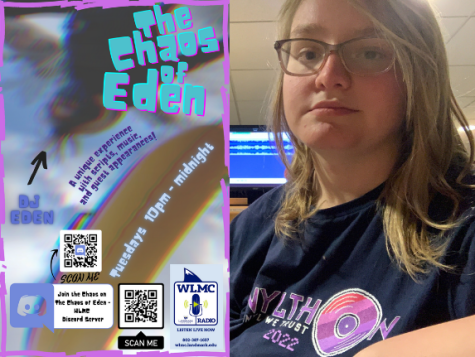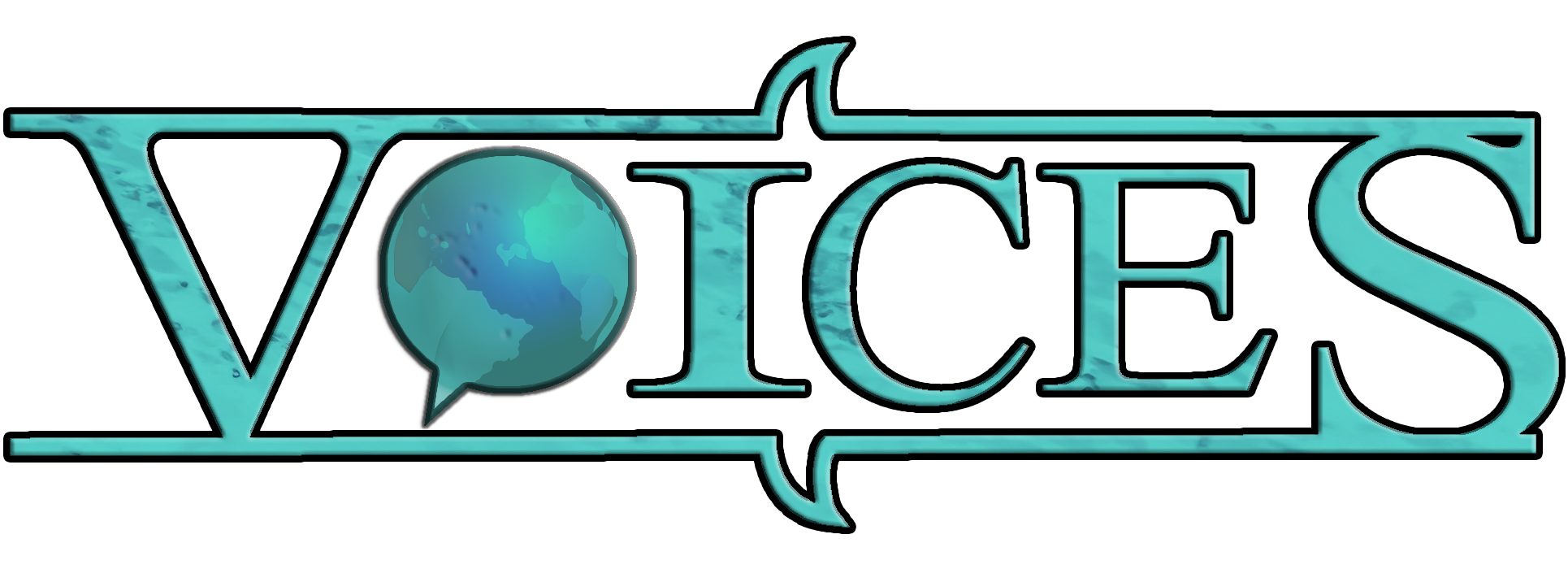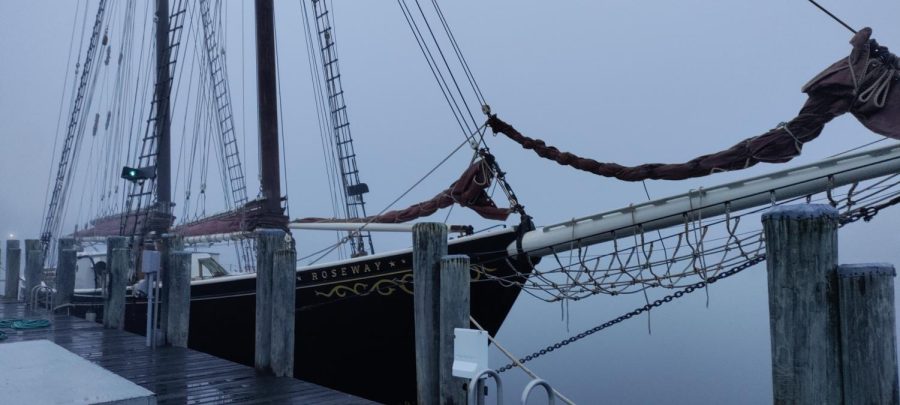Sailing on the Roseway
On the WLMC radio show, The Chaos of Eden, DJ Eden interviews Ben Heath as they talk about their experience sailing on the Roseway for the PHE1168 course, Beginning Boating Skills. The class was taught by World Ocean School. Right after the course, Ben was offered a summer job to work and live on the ship all summer, helping the crew teach in their programs.
To listen to the full interview, click on the link below, or keep scrolling to read through the transcript!
https://soundcloud.com/eden-kayser-454111870/roseway-interview-chaos-of-eden-with-ben-heath?utm_source=clipboard&utm_campaign=wtshare&utm_medium=widget&utm_content=https%253A%252F%252Fsoundcloud.com%252Feden-kayser-454111870%252Froseway-interview-chaos-of-eden-with-ben-heathEden: Hello! You’re listening to WLMC Radio at Landmark College in Putney Vermont. This is DJ Eden from the Chaos of Eden and tonight I have my first guest star Ben Heath.
Say hello Ben!
Ben: Hello! Hello!
Eden: So today we’re going to be talking about our experience sailing on the Roseway, where we spent five days on the ship.
It was supposed to be part of the St. Croix study away trip but that got cancelled for covid so we had it in May instead.
But I thought it was a really good experience.
What about you Ben?
Ben: Thanks Eden, I was also on the trip along with 3 other Landmark students, this was a five-day trip and we left right after the graduation ceremony.
You were part of that weren’t you?
Eden: Yeah, I was! I got my associates degree.
Ben: You got your associates degree and you brought your cap and gown with on the ship.
Eden: I did! I took pictures that are posted on my Facebook page.
Ben: So, this trip, we both think was amazing. The crew is about eight to ten individuals, men and women, between the ages of twenty and thirty I would say, and they’re mostly AmeriCorps volunteers who are signed up for a year to work abroad this almost one-hundred-year-old schooner, which spends six months of the year in St. Croix, Virgin Islands, running educational programs, and then in May transits from St. Croix to Boston MA where it spends the rest of the year doing educational programs in Boston.
So, our trip was actually the last week of their transit. We docked in Mystic CT for a short while to provision and do some repairs, but we got to be on the last five days of their transit to Boston which was awesome.
Eden: Yes, it was awesome. I also heard the trip from St. Croix to Boston is very long.
Ben: From what I understand it’s about two and a half to three weeks and its constant sailing.
So, we were students and me and Eden had this educational experience of learning how to do everything on the boat, from boat checks to chores to proper etiquette, and there’s a lot.
I was actually offered a summer job to work as a deck hand educator just like the crew, which I was just amazed that they would offer that to me. I’ve had some conversations with the crew that I was interested in education, but I was just amazed it happened so fast. As soon as we docked in Boston at the end of our trip, the CEO, Eden (also named Eden) and the assistant director, Steve was there and they said “Yeah, when can you start?”. I said “I guess Monday” and this was on a Thursday.
Eden: I think they even said “You can could just unpack”.
Ben: Yeah, “Stay on the boat right now”.
Eden: Eden offered me the same thing too, I decided not to just because I have friends and a boyfriend at home, so I thought it would be hard for them and for me to spend all summer on the boat when I haven’t seen them all year.
Ben: And that’s understandable.
Eden: Yeah, but I still wish I could’ve been there. I wish I could’ve had it both ways.
Ben: Yeah, that certainly would’ve been really awesome if two Landmark students had ended up staying, and I think you would’ve been great at it because you dove right into the experience.
Eden: Yeah, I feel like I was kind of nervous the first day but I wasn’t really expecting the crew to be so nice and welcoming so that really helped the experience. I do miss them and wish I could talk to them, but that’s really cool that you got to spend all summer with them.
Ben: Not only is it a special boat, but it’s a historic landmark, extremely well-preserved for a one-hundred-year-old wooden boat, they tend to fall apart.
Eden: It was 1925 I think.
Ben: Yes, built in 1925. But it’s really the people who make it a really special experience because they’re not only deckhands running the boat and all the sailing and maintenance and work, but teachers who live 24/7 with students once students are on the programs.
Ours was five days but over the summer we had to do three ten-day trips all nearly back to back. We had some days off between though, but my god it was exhausting but the most amazing experience of my life.
Eden: What age groups were on there for ten days?
Ben: They were high school age, so the first couple were fourteen and fifteen-year olds. The last one was sixteen and seventeen, some even eighteen and nineteen.
Eden: Wow, yeah, I think Landmark is so far the only college to do a trip on that boat, because mostly its middle school and high school. Also, they do stuff for families too.
Ben: Yeah, they do day programs for younger kids like elementary and even lower-elementary age kids. But they do charter sails in Boston harbor and those often involve families coming on, and families of former crew members coming on, and that’s not the main mission of World Ocean School but it certainly helps pay the bills and it really helps spread awareness for their educational programs.
Eden: So, we all got awards at the end on paper plates, I got the highest climber.
Ben: Of course! Because you went all the way up the shroud.
Eden: Yeah, I tried to find whales but there weren’t any. I got sunburnt however.
Ben: Oh, that is something. It’s so weird when you’re on the boat your always in the sun, and even if you’re not in-in the sun, it’s reflecting off the water and there’s very little shade. There’re sails but they don’t give very much shade.
Eden: There was one shower, but it was reserved for the chef I believe.
Ben: Yes, the fresh water tanks only hold so much water and I got to fill those over the summer to run the hose out when we were back on land. But no one takes a shower, do you remember what we did to bathe?
Eden: I know we went in the ocean at one point. It was cold.
Ben: It was really-really cold. It was the middle of May and we went off the Boston islands. But you can also take bucket showers which is just exactly what it sounds like, bucket overboard with a rope tied on, bring it up and pour it over yourself, lather yourself over with soap and get another bucket to rinse.
Did you actually use the fire hose to scrub the deck?
Eden: I did that once, yes.
Ben: Yeah, so it’s a great big fire hose that shoots water out with such great force, and we use it every day to clean and scrub.
Eden: Swab the deck.
Ben: Exactly, there was one point over the summer on a program where we rigged it up to the forestays so just above and it would rain down on people like a real shower. That worked pretty well.
Did we look at the chart ever during that trip? I know we started doing that on later trips during the summer. We would take the students at night and look over the chart of where Roseway had gone that day.
Eden: Oh, the navigation stuff? Yeah, we did some of that. We would mark where we were on the map and took coordinates every hour.
Ben: Yes, we logged them, and at night we would take anchor bearings. Because we drop anchor every night if we can’t dock, there is a risk. Just because you drop anchor, it doesn’t mean it’s actually going to dig in or stay the entire night. So, we take three bearings and check them every hour through the night on night watch, so that we can tell if the boat is drifting and that could potentially be dangerous to wake up in a spot where you didn’t plan to be, like maybe on the rocky coast or on ground.
Eden: That reminds me, I steered through rocks.
Ben: You did?
Eden: Yeah, you don’t remember that?
I think it was maybe my first time on the helm, I was kind of scared.
Ben: But that is exactly the kind of experience that the crew is trained to put students through, everything they do the students should be able to do. Now not everything, but stuff like steering the boat, every student gets a turn at least once, usually multiple times during the program, and I love that experiential part of it. It’s like do everything, learn everything.
Eden: Yeah, you actually become part of the crew.
Ben: You do.
Eden: Even if it’s just for a short time or just as a learning experience, it’s a very active and hands on experience.
Ben: Extremely hands on.
What else did we do?
Eden: Well, I struggled with knots the entire time.
Ben: Oh, during the knot lessons?
Eden: Yes, that was probably the part I struggled with the most. I was able to do them a few times but I just have a hard time with coordination.
Ben: Knots are trickier than people imagine before they try them, especially the eight knots that Roseway teaches on their programs.
Eden: One thing I could do was make working coils. I made a lot of those.
Ben: The big lines that run up the stays and connect to the sails, those lines come down and wrap around a pin and we have to safely handle those because there can be so much tension in them from carrying a three-thousand-pound sail that you don’t want your fingers or anything caught once you wrap them around the pin. Eden’s talking about the correct way to store the end of the line on to the deck or sometimes they get hung up.
Do you remember doing the working coil and the Ballentine coil?
Eden: Yes, I did both, the Ballentine one was the three circles right?
Ben: Yeah.
Eden: Yeah, I remember that one, those ones I could do.
Ben: Do you remember which one you do first?
Eden: You do the working coil first.
Ben: Yes, you do the working coil first and you start from the working end because the bitter end is the very-very end of the rope, so you want the bitter end to come out on top after you coiled it onto the deck. Then you start from the bitter end and do the Ballentine coil so that when your done, the working coil feeds directly onto the pin so it runs up onto the rigging, so that if the line had to be let free fast it wouldn’t get caught up on itself and make a horrible mess.
Eden: I remember having to pull the sails up when we started sailing each morning.
Ben: Yes, we had to take up the sails in the morning and pull them down at night, and sometimes we would do the old school sailing maneuver.
Do you remember what sailing onto the hook?
Eden: Oh yeah, we did that once.
Ben: Yeah, Landmark did it once, where you literally don’t use the engine at all and just sail to where you cast anchor and immediately take the sails down and the momentum actually helps the anchor hook to the seabed, which is the old school cool maneuver that the captain likes to do.
For the full story, please listen to the recording from the WLMC Radio Show, The Chaos of Eden, which is live every Tuesday from 10:00pm to midnight. For more fun content including music, talk shows, news, sports, and more, check out shows from other DJs on the 2022 IBS award winning station, WLMC, Landmark College’s Streaming Radio Station.

Eden Kayser '24 is a BA-COMEL graduate with a Minor in Education. Her roles in LC Voices included Station Manager of WLMC, Director of Operations of the...



Lee Crocker • Oct 4, 2022 at 2:27 pm
Ben and Eden: I love this interview and hearing all about your experiences.